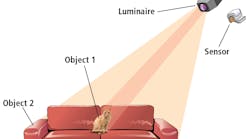Bernd Keller of Cree Lighting described progress made with the company's XThin XT-27 chips, which have been used to fabricate high-performance white LEDs in the lab.
Keller said that white LEDs with a color temperature of 6000K had achieved a record efficacy of 82 lm/W at 20 mA, with a flux of 5.2 lm. At 4600K, devices with 92 lm/W efficacy and 5.8 lm flux have also been demonstrated. These developments have been achieved following improvements in chip and materials fabrication that have resulted in a record quantum efficiency of 50%.Equally impressive results have been achieved for white LEDs fabricated using much larger XB900 chips, which have demonstrated a flux of 67 lm at 350 mA with an efficacy of 57 lm/W. At a higher current of 1 A, the efficacy dropped to 34 lm/W but the total lumen output was 142 lm...from a single chip.
Keller also spoke about the need to differentiate its line-up of LED chips in order to meet the needs of different applications. To this end, the company has developed a 500 x 500-micron chip (XB500) designed to run from a drive current of around 125 mA (radiant flux of 90 mW), which bridges the gap between the XB900 (200 mW @ 350 mA) and the XT270 (64 mW @ 20 mA).
One size does not fit all
According to Nichia's Drake Stallions, the Japanese company is also intent on providing choice for its customers, and places its white LEDs into 4 categories: 5 mm, SMD, mid-flux (named Rigel) and high-flux (Jupiter). While the former two have a flux of around 3 lm, Rigel packages provide around 15 lm for channel letters and task lights, while Jupiter provides 42 lm with a range of available optics.
Although 5 mm and SMD white LEDs have a low flux, they have a very high efficacy of around 50 lm/W. Stallions said that the efficacy of 5 mm LEDs has doubled since 2002, and that targets for 2007 and 2010 are 70 lm/W and 100 lm/W, respectively.
Thin-film progress at Osram
Klaus Streubel from Osram Opto Semiconductor described progress with Thin-Film technology, which results in very high luminance (brightness) LEDs. To fabricate AlGaInP Thin-Film LEDs, Osram bonds 4-inch LED epiwafers to germanium carrier wafers, and then removes the GaAs. A metal layer at the bond interface serves as a highly reflective mirror and as an electrical contact. Buried prismatic structures are also used to improve extraction efficiency.
Osram has already reported 614 nm LEDs with an efficacy of 108 lm/W. At longer wavelengths, said Streubel, the LEDs are better but the efficacy is lower due to the eye sensitivity curve. Performance decreases at shorter wavelengths due to materials issues.
For larger-area (1 x 1 mm2) AlGaInP devices operating at 627 nm, Streubel reported a flux of 96 lm with a current of 1 A, and a wall-plug efficiency of 40% at around 100 mA.Similarly, high-performance AlGaAs Thin-Film devices with infrared emission at 850 nm were reported to have a flux of 500 mW for a single, 1 x 1 mm2 chip operating at 1 A.
Thin-Film InGaN devices have also been fabricated, and these have a very low forward voltage of only 3.1 V. Streubel reported green LEDs in a lensed Golden Dragon package with an output power of 55 lm at 350 mA, and 110 lm at 1400 mA.
White LEDs in a Golden Dragon package without a lens produced a flux of 48 lm at 350 mA and 3.1 V (equivalent to an efficacy of 44 lm/W), and 110 lm at 1400 mA (25 lm/W).
High-power LED developments
October was a busy time for the LED industry, with numerous announcements regarding progress in the field of high-power LEDs.
At around the same time as Lamina Ceramics unveiled its 13,300-lumen, 810-LED array, Hong Kong-based LED manufacturer Cotco announced that it has developed a one-watt LED package that it calls the Dorado.
Cotco's Dorado joins a growing list of watt-level LEDs in the market-place, including Lumileds' Luxeon I, III and V, Osram Opto Semiconductors' Golden Dragon, Nichia's Jupiter, Seoul Semiconductor's Z-Power LED, and Cree's XLamp.
At the LEDs 2004 conference, Japan's Rohm Electronics exhibited a series of high-power LED packages based around chips from Cree (for green, blue and white) and other suppliers. Although little information was available for the products, shown earlier in October at CEATEC in Japan, the lumen output was listed as follows: red - 35 lm, orange - 40 lm, yellow - 30 lm, green - 25 lm, blue - 15 lm, and white - 35 lm.
Rohm also displayed side-emitting white LEDs with a very high brightness of 600 mcd (at 20 mA). The surface-mount package has a thickness of only 0.8 mm, making it highly suited for thin full-color liquid-crystal display designs. The product has chromaticity coordinates of x = 0.30, y = 0.31.
Also at the same event, LEDs Magazine spoke with Tom Jory, VP of sales and marketing with eLite Optoelectronics, a company based in Sunnyvale, CA, that designs high-power InGaN-on-sapphire LEDs. eLite is fabless, and the 1 x 1 mm2 chips are manufactured through a foundry agreement with a Taiwanese company.







